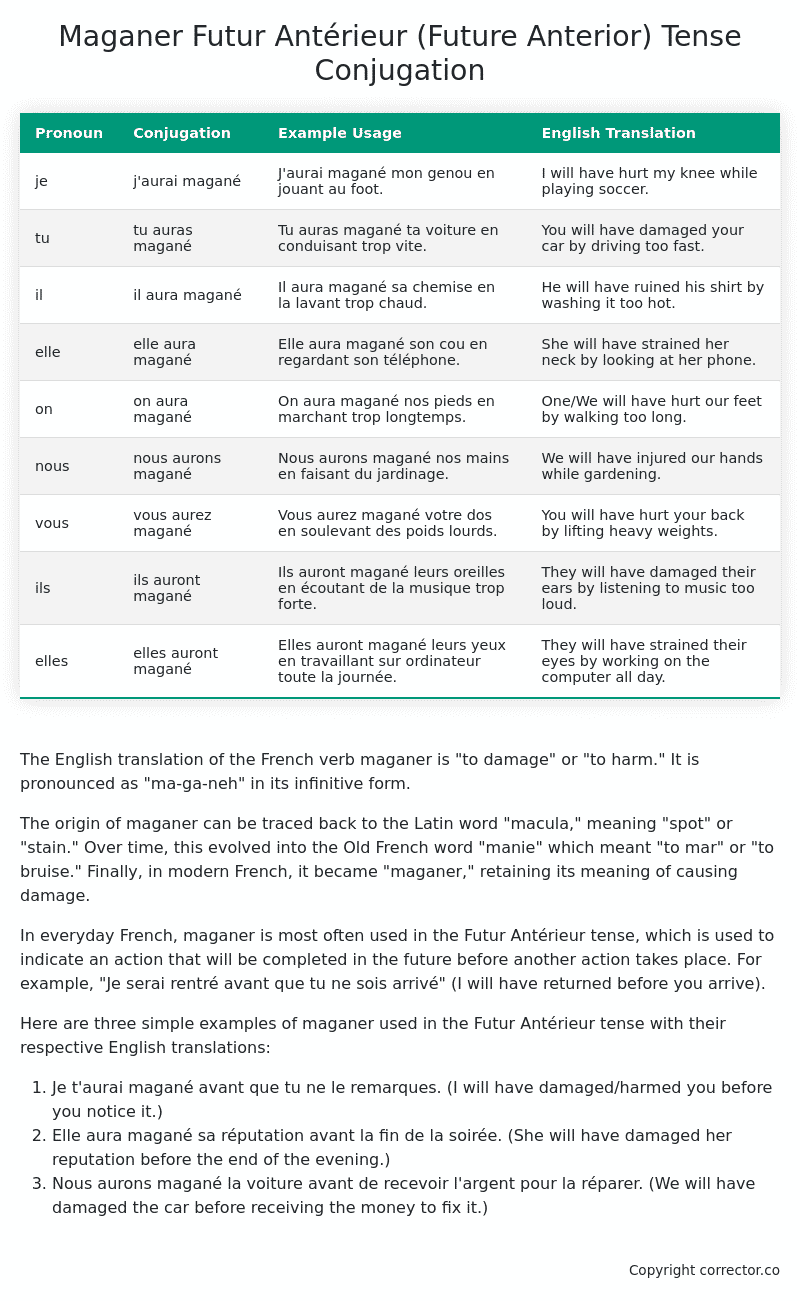Futur Antérieur (Future Anterior) Tense Conjugation of the French Verb maganer
Introduction to the verb maganer
The English translation of the French verb maganer is “to damage” or “to harm.” It is pronounced as “ma-ga-neh” in its infinitive form.
The origin of maganer can be traced back to the Latin word “macula,” meaning “spot” or “stain.” Over time, this evolved into the Old French word “manie” which meant “to mar” or “to bruise.” Finally, in modern French, it became “maganer,” retaining its meaning of causing damage.
In everyday French, maganer is most often used in the Futur Antérieur tense, which is used to indicate an action that will be completed in the future before another action takes place. For example, “Je serai rentré avant que tu ne sois arrivé” (I will have returned before you arrive).
Here are three simple examples of maganer used in the Futur Antérieur tense with their respective English translations:
- Je t’aurai magané avant que tu ne le remarques. (I will have damaged/harmed you before you notice it.)
- Elle aura magané sa réputation avant la fin de la soirée. (She will have damaged her reputation before the end of the evening.)
- Nous aurons magané la voiture avant de recevoir l’argent pour la réparer. (We will have damaged the car before receiving the money to fix it.)
Table of the Futur Antérieur (Future Anterior) Tense Conjugation of maganer
| Pronoun | Conjugation | Example Usage | English Translation |
|---|---|---|---|
| je | j’aurai magané | J’aurai magané mon genou en jouant au foot. | I will have hurt my knee while playing soccer. |
| tu | tu auras magané | Tu auras magané ta voiture en conduisant trop vite. | You will have damaged your car by driving too fast. |
| il | il aura magané | Il aura magané sa chemise en la lavant trop chaud. | He will have ruined his shirt by washing it too hot. |
| elle | elle aura magané | Elle aura magané son cou en regardant son téléphone. | She will have strained her neck by looking at her phone. |
| on | on aura magané | On aura magané nos pieds en marchant trop longtemps. | One/We will have hurt our feet by walking too long. |
| nous | nous aurons magané | Nous aurons magané nos mains en faisant du jardinage. | We will have injured our hands while gardening. |
| vous | vous aurez magané | Vous aurez magané votre dos en soulevant des poids lourds. | You will have hurt your back by lifting heavy weights. |
| ils | ils auront magané | Ils auront magané leurs oreilles en écoutant de la musique trop forte. | They will have damaged their ears by listening to music too loud. |
| elles | elles auront magané | Elles auront magané leurs yeux en travaillant sur ordinateur toute la journée. | They will have strained their eyes by working on the computer all day. |
Other Conjugations for Maganer.
Le Present (Present Tense) Conjugation of the French Verb maganer
Imparfait (Imperfect) Tense Conjugation of the French Verb maganer
Passé Simple (Simple Past) Tense Conjugation of the French Verb maganer
Passé Composé (Present Perfect) Tense Conjugation of the French Verb maganer
Futur Simple (Simple Future) Tense Conjugation of the French Verb maganer
Futur Proche (Near Future) Tense Conjugation of the French Verb maganer
Plus-que-parfait (Pluperfect) Tense Conjugation of the French Verb maganer
Passé Antérieur (Past Anterior) Tense Conjugation of the French Verb maganer
Futur Antérieur (Future Anterior) Tense Conjugation of the French Verb maganer (this article)
Subjonctif Présent (Subjunctive Present) Tense Conjugation of the French Verb maganer
Subjonctif Passé (Subjunctive Past) Tense Conjugation of the French Verb maganer
Subjonctif Imparfait (Subjunctive Imperfect) Tense Conjugation of the French Verb maganer
Subjonctif Plus-que-parfait (Subjunctive Pluperfect) Tense Conjugation of the French Verb maganer
Conditionnel Présent (Conditional Present) Tense Conjugation of the French Verb maganer
Conditionnel Passé (Conditional Past) Tense Conjugation of the French Verb maganer
L’impératif Présent (Imperative Present) Tense Conjugation of the French Verb maganer
L’infinitif Présent (Infinitive Present) Tense Conjugation of the French Verb maganer
Struggling with French verbs or the language in general? Why not use our free French Grammar Checker – no registration required!
Get a FREE Download Study Sheet of this Conjugation 🔥
Simply right click the image below, click “save image” and get your free reference for the maganer Futur Antérieur tense conjugation!

Maganer – About the French Futur Antérieur (Future Anterior) Tense
Construction
Common Everyday Usage Patterns
Interactions with Other Tenses
For example
Summary
I hope you enjoyed this article on the verb maganer. Still in a learning mood? Check out another TOTALLY random French verb conjugation!


